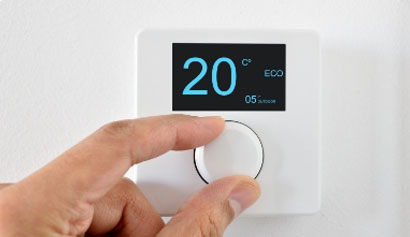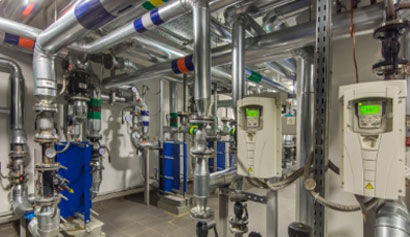5 Reasons to choose
Ground Source Heat Pumps
As well as being better for the environment and lighter on costs, there are many benefits to choosing a Ground Source Heat Pump…
GSHP systems are good citizens: they are silent, free from polluting chemicals, reliable and invisible. They are welcomed by planning authorities and architects. They produce no carbon emissions on site, and none at all if powered by renewable electricity. There have never been any political objections to GSHP systems in the way that wind turbines have caused unrest and resentment and expensive government schemes on other technologies have raised eyebrows at the wisdom of excessive government spending.
GSHPs do not suffer the problems of “intermittency” that effect renewable energy from wind turbines, photovoltaic cells or solar thermal panels. Indeed the Thermal Energy Storage capacity of the ground can be used to compensate for the intermittent supply of energy from other renewable sources.
Unlike any other form of Renewable Technology the power of a heat pump can be reversed in summer to provide cooling. In the case of an air source heat pump (or an air conditioning chiller) heat taken out of a building in summer is merely “wasted” to the atmosphere. It is a very expensive option to provide cooling by heat exchange with hot air. The radical, renewable cooling, alternative is to use a ground source heat pump to heat exchange with cold ground: the primary advantage is that it is much more efficient than heat exchanging with hot air.
The secondary advantage is that a by-product of renewable cooling is to deposit heat into the ground – in advance of the time in winter when the heat pump will be looking to extract heat from the ground.
Although ground source energy requires upfront investment, the reductions in emissions of greenhouse gases are very great and an investment in ground source energy lasts much longer than other investments in renewable energy. The ground works installed for ground source systems, a major part of the cost, can be expected to last for over 100 years. The ground source heat pumps themselves are very reliable pieces of equipment with a long life – longer than air source heat pumps which have to be located outside, have more moving parts, including air circulation fans, and need to incorporate energy-consuming defrosting elements to contend with the formation of ice in winter. GSHP installations compare favourably with all other forms of Renewable Heating and all other mechanisms for generating Renewable Electricity in terms of life span.
Ground source heat pump installations have very low running costs because they exploit the fundamental characteristic of the ground to act as an efficient store of thermal energy. In very cold weather, when heating is most needed, a ground source heat pump has access to warmer temperatures from the ground than an air source heat pump has from ambient air.
The Thermal Energy Storage capacity of the ground allows GSHPs to be used efficiently at all hours of day and night – this provides the opportunity to use GSHPs at night when electricity is cheaper.
160+
GSHPA Member Companies
250+
individual member contacts
600k
Target number of UK Heat Pumps by 2028
+7.4%
European heat pump sales growth in 2020
Join the GSHPA
Training Academy
A complete guide to learning everything you need to know about ground source heat pumps.

Latest insights from GSHPA
Keep up to date with our latest news and events
GSHPA Spearhead Groundbreaking Drilling Standard and Audit, Elevating Ground Source Sector
Category: News, Press | Dec 2023
MCS and the GSHPA have combined their resources and expertise to pioneer a ground breaking Drilling Standard tailored specifically for the Ground Source sector. In a concerted effort to improve industry excellence and bolster customer trust, an associated, industry-specific Drilling Audit has been meticulously crafted and is now readily available for registration by drilling companies.…
(GSHPA) Announces Ken Gordon as New Chief Executive Officer
Category: News | Jul 2023
GSHPA Council member Andy Louths Hard Work Royally Pays Off
Category: News | May 2023



